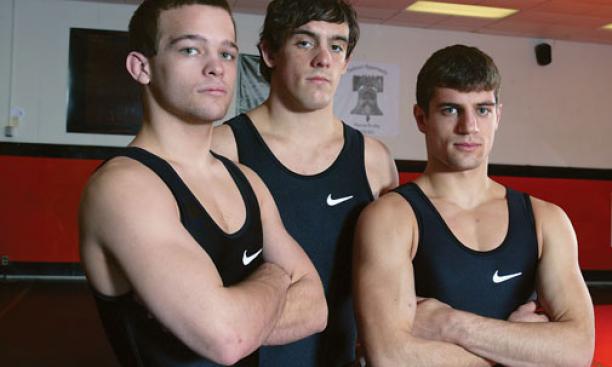

The reversal is one of wrestling’s sweetest moves. It’s even more satisfying when an entire program pulls off a reversal. This year the Princeton wrestling team placed fourth in the Keystone Open; beat Old Dominion, a near-Top 25 team; and placed two wrestlers in the top eight at the prestigious Midlands Championships.
That might not sound earthshaking, but it’s a long way from 1993. That was the year the University, citing financial and admission pressures brought on by the implementation of Title IX, announced plans to cancel the sport. Outraged, Princeton’s wrestling community sprang into action. The team organized a 24-hour wrestle-athon in Firestone Plaza, and more than 100 wrestling alumni raised $3 million to fund a bare-bones program. The team was in limbo, and conditions were grim: With the wrestling room in the bowels of Jadwin Gym already converted to a weight room, the wrestlers found themselves banished to Dillon. Each day they had to roll out the mats for practice and put up with volleyballs bouncing over their backs.
The program was scuffing along three years later when iconoclastic feminist scholar Camille Paglia was invited to campus to debate the topic “Wrestling is good for Princeton University.” In a swashbuckling performance, Paglia praised the sport for its “pagan principle of the strength of the body” and lauded its “ethnic diversity,” which, she said, brings “blue-collar students” to campus. The debate got national press, and the University gave up on eliminating the sport.
When Chris Ayres took over as head coach six years ago, wrestling had little more than club status. A spotty roster meant the team often would travel to meets knowing they would have to forfeit three or four matches. Despite wrestling mostly Division II and III schools, the Tigers lost every meet they contested from 2006 to 2008, winning just 11 individual matches out of 198 in Ayres’ first season. That was especially tough for Ayres, who had set a school record for career wins as a student at wrestling powerhouse Lehigh University.
Co-captain Daniel Kolodzik ’12 recalls the tough losses in his first years with the team: “Chris would be pretty bummed on the bus ride home. But on Monday he’d come in with all sorts of great ideas. He’s really good at focusing on the future.”
Kolodzik, it should be noted, didn’t even have a team in high school. As the only wrestler at Miami Valley School in Ohio, he had to travel to nearby schools just to have someone to work out with. This season he is 18–7, with an eighth-place finish at the Midlands.
It was Adam Krop ’14 who stunned the crowd at the Midlands by nearly beating the nation’s top wrestler in the 141-pound weight class, Iowa’s Montell Marion, and finishing third overall.
Garrett Frey ’13 — Princeton’s top point-winner for the last two seasons — is wiry and focused, popping with intensity. “I feel like wrestling is sport at its rawest, purest form,” he says.
The coach has sold recruits on the idea that they can be part of a rising program, and it has worked. “A lot of people had written us off. Now, we make people nervous,” he says.
Princeton’s wrestlers are relentless scrappers, and they are making the most of the program’s second chance.
Extra Point explores the people and issues in Princeton sports.
Merrell Noden ’78 is a former staff writer at Sports Illustrated and a frequent PAW contributor.
